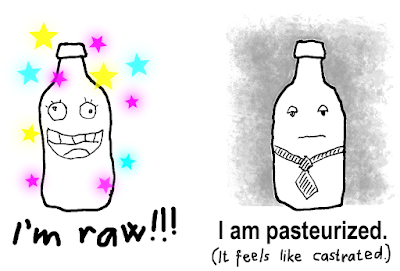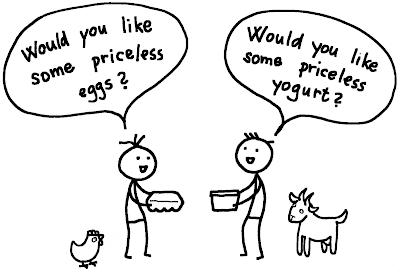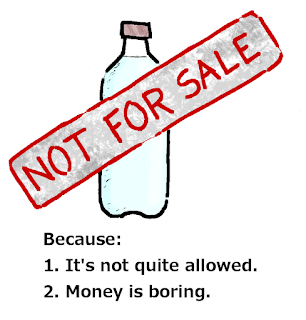 |
| A Goat and a me. |
These are not just any goats. These goats' milk and yogurt I've been occasionally having for breakfast for the past few months.
After several virtually milk-less and yogurt-less years in Japan, this is a welcome change. I'm deeply indebted for this treat to the goats and to their owner Fujioka-san.
 |
| A Goat and Fujioka-san. |
 |
| Ha! |
There are two reasons why Fujioka-san will not sell this milk, or yogurt, or cheese, to you: one is a prosaic technical reason, the other is a philosophical one.
First, the prosaic reason. In Japan it's forbidden to sell unpasteurized milk or products made from such milk, like unpasteurized yogurt or cheese. (Unless it's imported cheese, in which case it's okay. Smells like double-standard? Yep, that's what it is.) Of course, if you have goats, you can have raw milk for personal consumption, but you're not allowed to sell it.
In the process of pasteurization, milk is heated in order to kill microorganisms present in raw milk. The official reason is food safety, the real reason is extending the shelf life, which enables mass production, mass distribution and mass consumption of milk.
Unfortunately, pasteurization kills not only the 'bad' microorganisms, but also a lot of the 'good' ones (the "probiotics"), as well as some very good enzymes, vitamins and minerals.
So pasteurized milk has less bacteria, but also less nutrition and poorer taste.
The milk from Fujioka-san's goats is raw, which means it's valuable, and unsellable. The only way how to get it is: Step 1, become friends with Fujioka-san; Step 2, if possible, have something useful to barter. With this predicament, I feel lucky to have our hens, because I can barter their eggs for goats' milk and yogurt. It's been working for a few months now and I couldn't imagine a better deal.
The topic of bartering leads us to the second, philosophical reason why this milk is not for sale: It's because Fujioka-san prefers non-monetary exchange. If you're wondering why would anyone prefer bartering to hard cash, you'd better ask Fujioka-san directly. My attempt to explain his theories, relying only on my poor memory, would lead to inexcusable distortion.
Speaking for myself, bartering feels good - much better than buying stuff in a big, impersonal store. The best thing about bartering is, obviously, the fact that it doesn't involve money. When money - with the exact price and the notion of "cheap" and "expensive" - is not involved, other dimensions can come to the foreground, most importantly the object and the subject of the barter deal. The thing and the person. Everything that is usually invisible, hidden behind the price tag, is now part of the deal. Your bartering partner is not a stranger but a friend. The two things that change hands are made with attention and pride, and are appreciated by the other side. Also, the amount (what would otherwise translate into an exact "price") is fluid. This time I have fewer eggs than last time, but Fujioka-san has more milk, and that's fine. Next time it might be the other way round, or maybe not. Nobody is calculating. Bartering is flexible, because it's not about money.
But what I most appreciate about this milk is not that it's raw, or that it's bartered, although these two features certainly make it very special. My appreciation has more to do with the goats.
The reason why I haven't been consuming much milk or yogurt in Japan is not their unavailability. There is plenty of milk and yogurt in grocery stores and they are cheap, but knowing the reality behind Japan's dairy industry, I simply didn't feel like buying any.
Fujioka-san's goats are outside eating grass on most days, and the baby goats spend at least the first month of their life with their mum. As far as I know, neither of this can be said about generally available mass produced milk and dairy products, where cows are kept inside the barns, eat grain rather than grass, and calves are separated from their mums soon after birth.
To me, bartering milk provided by goats grazing just two kilometers off my place is much more fun than buying anonymous milk in the supermarket. One thing I should work on now is to go and say hello to the goats more often. Now that I have quite extensive knowledge about goats' favorite types of grass, I'm pretty sure I could bribe them into a friendship :)




